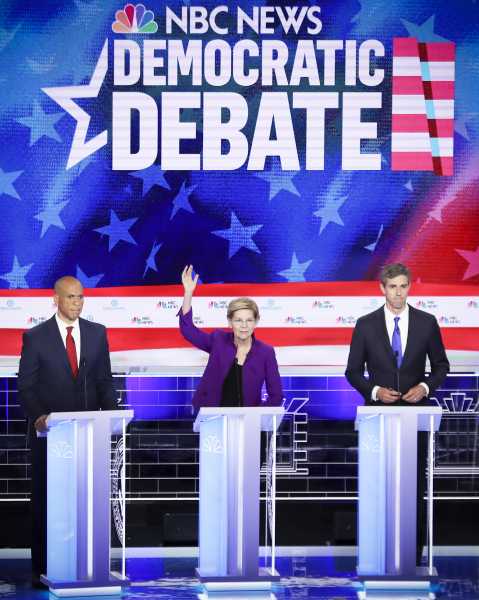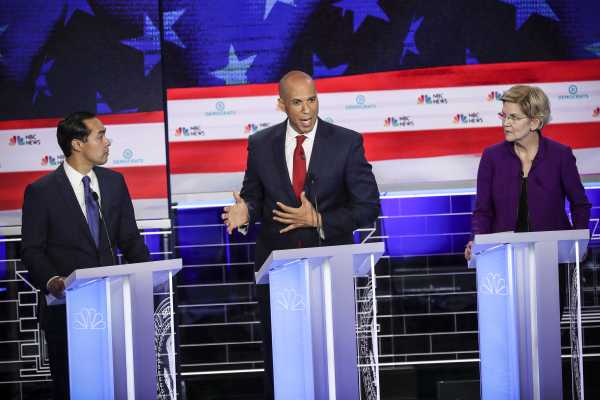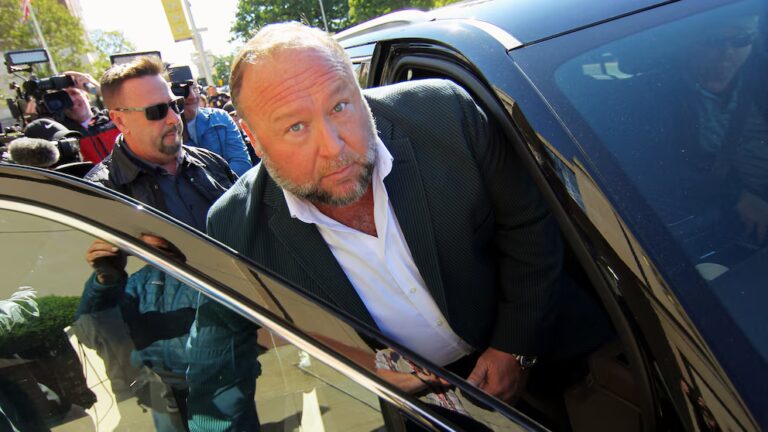
Just 20 minutes into the first Democratic presidential debate, NBC’s Lester Holt asked for a show of hands on the biggest question about Medicare-for-all, a top progressive policy goal: Would you abolish private insurance?
It’s a controversial question even though many of these candidates have spoken favorably about a plan to move America to single-payer health insurance.
Only two Democratic candidates — Sen. Elizabeth Warren (D-MA) and New York City Mayor Bill de Blasio — put their hands up.
As Vox has explained at length, employer-sponsored insurance is one of the biggest challenges for single-payer health care. Half of Americans — 150 million people — currently get their health insurance through their employer. Under the Medicare for All bill written by Sen. Bernie Sanders (I-VT), every American would be moved into a government health plan within a few years. Private insurance effectively would be banned from covering most major medical care. Sanders and the left believe that employer-sponsored insurance, as workers today face higher and higher out-of-pocket costs, isn’t working anymore.
But other Democrats either think it’s too big a political risk to disrupt health insurance for half the population or simply believe the private market should have a role in covering people. They support other proposals, like Medicare “for all who want it” or a public option for Obamacare’s marketplaces, allowing more people to voluntarily buy into a government plan, but wouldn’t make it mandatory.
Democrats really do agree on expanding health coverage, but the gnarly question of eliminating private coverage reveals the central tension within the party: governing versus aspirations; what’s politically possible versus what’s desirable.
On Wednesday night, only Warren and de Blasio were willing to embrace the left’s position: Private coverage should be banned, and every American should get his or her health insurance from the government.
Elizabeth Warren went all in on Medicare-for-all at the first debate
Warren, a co-sponsor of Sanders’s single-payer bill, raised her hand in response to Holt’s question and confirmed she supports ending private insurance.
“Look at the business model of an insurance company. It’s to bring in as many dollars as they can in premiums and to pay out as few dollars as possible for your health care,” she said at Wednesday’s debate. “That leaves families with rising premiums, rising co-pays, and fighting with insurance companies to try to get the health care that their doctors say that they and their children need.
“Medicare-for-all solves that problem,” she continued. “There are a lot of politicians who say, ‘Oh, it’s just not possible, we just can’t do it,’ have a lot of political reasons for this. What they’re really telling you is they just won’t fight for it. Well, health care is a basic human right, and I will fight for basic human rights.”
It was a clarifying moment for Warren, who has at times been more circumspect about health care even as she sells herself as the “plan” candidate on other issues. She told the New York Times in its recent candidate survey that “‘Medicare for all’ has a lot of different paths.”
The activist and ideological left, for whom Sanders is such an important figure, has seized on Warren’s equivocation. Tim Higginbotham wrote an essay in the socialist journal Jacobin titled, “Elizabeth Warren Has a Plan for Everything — Except Health Care.”
On Wednesday night, though, she was unequivocal: “I’m with Bernie.”
It wasn’t a surprise to see de Blasio, who espoused a radical progressive vision on inequality throughout the debate, raising his hand next to her.
The other 2020 Democrats want to be careful about private insurance
But other Democrats weren’t willing to go as far.
Sen. Cory Booker (D-NJ) is, like Warren, a co-sponsor of Sanders’s Medicare for All bill, but he did not raise his hand in response to Holt’s query. He did promise to act on health care, but he left the details vague. In his response to the New York Times, Booker said he would start by pursuing a public option.
“We have to do the things immediately that provide better care,” he said at the NBC debate. “We can do this better, and every single day I will fight to give people more access and affordable cost until we get to every American having health care.”

Holt singled out former Rep. Beto O’Rourke, who previously said he supported Medicare-for-all but has since revised his stance. O’Rourke has endorsed the “Medicare for America” bill that maintains employer-sponsored insurance but allows anybody to join a government plan if they choose to; it also rolls Medicaid and Obamacare into the government plan.
Would he abolish private insurance? “No,” O’Rourke said. “I think the choice is fundamental.”
De Blasio, one of the punchier candidates on the stage Wednesday night, went after him from the left.
“Congressman O’Rourke, it’s not working for tens of millions of Americans when you talk about the premiums and the out-of-pocket expenses,” de Blasio said. “How can you defend a system that is not working?”
“So for those for whom it’s not working, they can choose Medicare,” O’Rourke replied in defense of his plan. “For those who it is working for, they are able to keep it.”
This health care debate is going to play out again and again in 2020
For now, ending private insurance is entirely an abstract question: Democrats would need to win the Senate, an unlikely outcome, along with the White House in order to try to pass a health care bill in 2021. But the posturing still reveals something about the candidates and the audiences they are playing to in the debate.
Warren and de Blasio are running hard to the left. Those candidates want to be seen as unafraid to take big, bold actions on major progressive policy concerns. Warren went out of her way to embrace the single-payer plan put forward by Sanders, her top rival for progressive voters, despite her previous willingness to entertain more incremental reforms.
But other candidates are more cautious. Health care reform is always difficult and often politically perilous. Polling shows many Americans are relatively happy with their current health coverage; that makes presidential candidates who aren’t as ideologically committed to Medicare-for-all nervous about saying they want to take it away.
Sanders has effectively made Medicare-for-all a litmus test for presidential candidates. Everybody else is reacting to his single-payer plan. For some, like Warren, that means going all in on endorsing a major overhaul of American health care. Others are looking for a middle ground.
Sourse: vox.com






